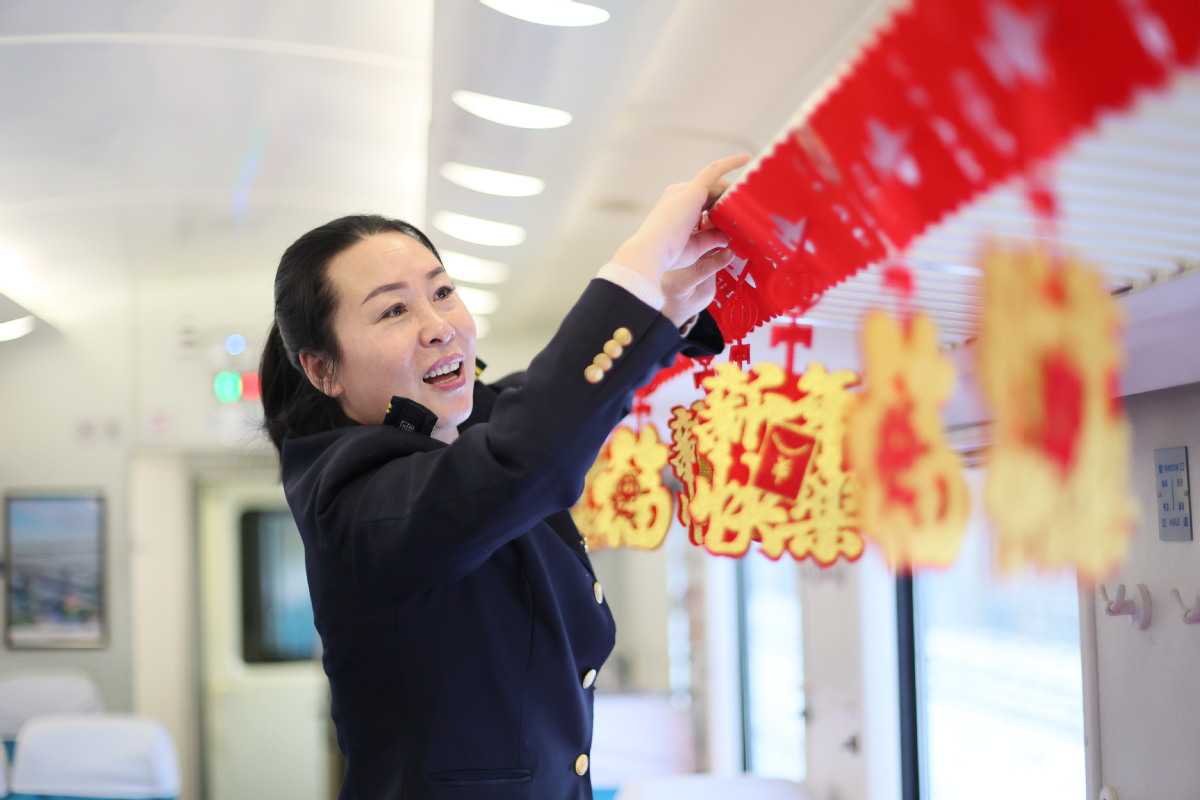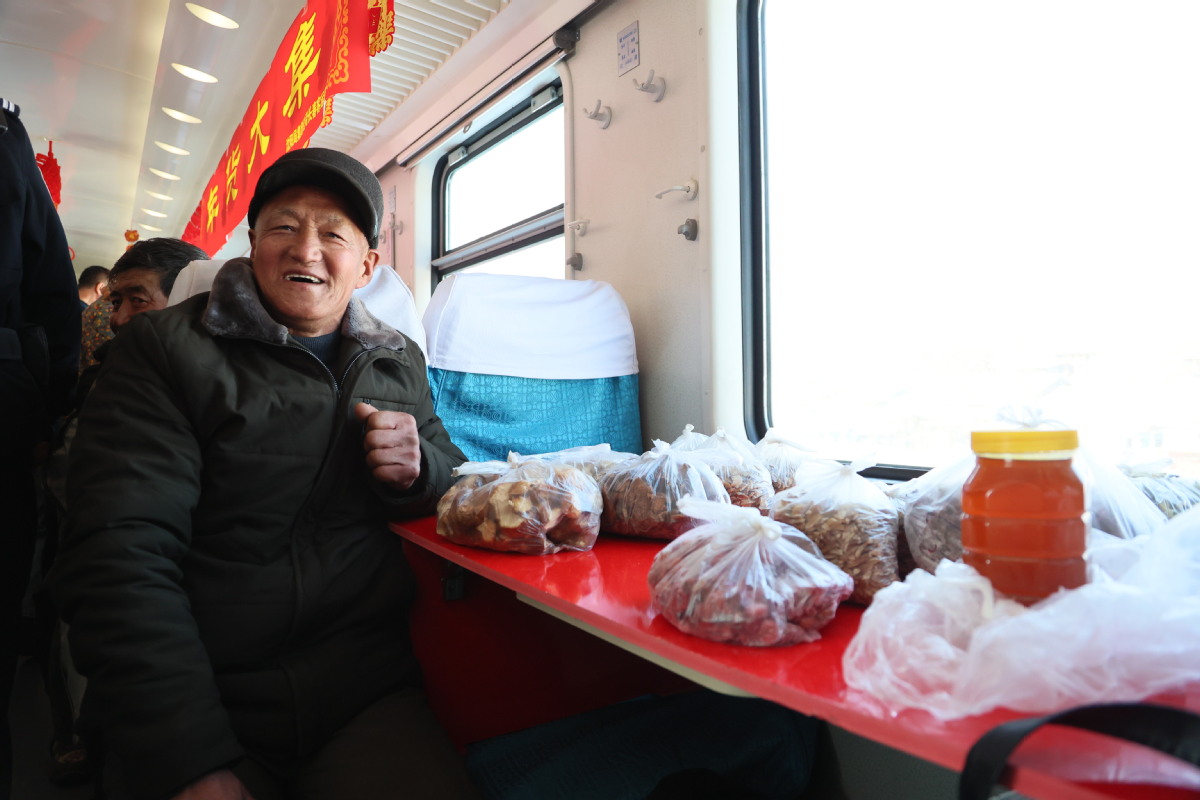
In 2024, the fair on Train 4318 is in full swing. [Photo by Li Pengbo/For China Daily]
As the 2025 Spring Festival travel rush—a time-honored tradition that sees millions of journeys across China—gradually winds down, it offers a poignant moment to reflect on the transformative impact of the country's railway development on the lives of millions. Among them is Liu Wei, a 23-year-old man whose life story is deeply intertwined with the rails that have shaped his past, present, and future.
Born and raised in Xiwei Village, a small settlement nestled in the mountains of Fengcheng City, northeastern China's Liaoning Province, Liu's early life revolved around the slow-moving trains that chugged through the region. These green slow trains were more than just a mode of transportation; they were a lifeline for Liu and his family. During his school days, Liu relied on these trains to commute to school, carrying his dreams of a better future in his backpack. The rhythmic clatter of the wheels on the tracks became a familiar soundtrack to his journey toward knowledge.

In 2024, the staff of Train 4318 decorates the carriage, filling the train fair with a strong flavor of the Spring Festival. [Photo by Li Pengbo/For China Daily]
Slow Trains Carrying Dreams and Lifeline
For Liu's family, the train was also an economic lifeline. His parents, who come from a modest background, relied on the train to transport locally harvested mountain vegetables and handmade handicrafts to nearby markets. This allowed them to earn a living and support Liu's education.
"The slow train took me to middle school and high school, and then the high-speed train took me to the university and work," Liu said, referring to the slow train as a bridge to link him and his family with the outside world.
Liu's hard work and determination paid off. Excelling in his studies, he progressed from the village primary school to a middle school in Shicheng Town, then to a high school in Fengcheng City. In 2020, he achieved a significant milestone by gaining admission to Dalian University. After graduating last year, Liu secured a job in Tianjin, earning a monthly salary of around 5,000 yuan ($688)—a figure he is proud of and satisfied with.
Despite his familiarity with train travel, it wasn't until 2020 that Liu experienced his first high-speed rail journey. "I even did some research beforehand to see if there were any special precautions," he said. "But the biggest difference was the speed. On the slow train, I used to sit and watch the scenery pass by. On the high-speed rail, everything just flashes past."
Liu was particularly struck by the quiet, clean, and comfortable environment of the high-speed train. "It's a completely different experience," he noted. "The high-speed rail represents progress, but the slow train will always have a special place in my heart."
Liu's family background adds another layer of poignancy to his story. His mother, a deaf-mute, and his father worked tirelessly to support his education by selling mountain products. Liu remembered how his mother would take the slow train to nearby markets, building a rapport with the train staff who often went out of their way to assist her.
"The slow train fare was only 2 yuan, much cheaper than the 18-yuan bus fare," Liu recalled. "It was a lifeline for people like us."
Last year, Liu took the high-speed rail from Tianjin to Beijing for the first time, fulfilling a long-held dream. He witnessed the national flag-raising ceremony and visited museums, marveling at how just 30 minutes on the high-speed rail could connect him to the heart of the nation.
"I want to bring my parents to Tianjin and Beijing someday," he said. "They've never been, and I want them to experience these places too."
Reflecting on the Spring Festival travel rush, Liu recalled his childhood journeys on the slow train with his family to sell goods at the Fengcheng market.
"The stations were outdated back then, and passengers would line up in crowded waiting halls," he said. "Now, with facial recognition technology and modern facilities, the experience is completely different."
Despite his appreciation for the convenience of high-speed rail, Liu holds a deep affection for the slow trains that once carried his dreams. "The fact that the railway department continues to operate these slow trains shows a commitment to serving the people," he said. "Fewer people ride them now, and they probably don't make much profit, but I hope they never disappear."

In 2024, the villagers of Xiwei village sell various mountain products they had harvested at the fair on Train 4318. [Photo by Li Pengbo/For China Daily]
A Mobile Market for Villagers
The 4318 and 4317 trains, which run between Tonghua in Jilin province and Dandong in Liaoning province, are among the low-speed trains, known as "charitable trains"—a service providing affordable railway access to residents in remote areas for charitable purposes. For over a decade, they have been the only passenger trains connecting Tonghua and Dandong, providing a vital link for residents in mountainous areas along the route, according to China Railway Shenyang Group, the regional railway operator.
The train services have served as an important bridge for locals with the outside world, enabling them to travel, go to school, seek medical care, visit relatives, and transport goods to market.
On this slow train, villagers along the line can bring their mountain products on board and sell them. The train has even transformed into a mobile market.
"Since many villagers bring mountain products to the market for sale, to facilitate their sales, every Friday, a 'train market' is set up on the train," said Zhang Weichen, an official from China Railway Shenyang Group.
According to Zhang, the idea of the "train market" was proposed to better serve the local villagers.
"We noticed that the villagers had a strong demand for selling their products, so we decided to create this special trading opportunity on the train," Zhang said. This initiative has not only increased the income of the villagers but also enriched their daily lives. Liu and his family are among those who have benefited from the "mobile market."
As China continues to lead the world in high-speed rail development, with the longest network of tracks globally, it also maintains 81 pairs of "charitable slow trains" across more than 20 provincial regions. These trains, though slower, serve as a testament to the warmth and inclusivity of China's railway system, ensuring that even the most remote communities remain connected to the broader tapestry of the nation's progress, according to China State Railway Group, the national railway operator.
For Liu Wei, the rails—both slow and fast—have been more than just a means of transportation. They have been the tracks that carried his dreams, his family's livelihood, and his hopes for the future. As China's railways continue to evolve, they remain a powerful symbol of the country's commitment to bridging distances, connecting lives, and driving forward into a brighter tomorrow.
Liu Shupeng and Liu Qian in Nanchang, Zheng Zheng in Shanghai contributed to this story.